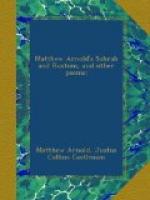=181-190=. Daphnis, the ideal Sicilian shepherd of Greek pastoral poetry, was said to have followed into Phrygia his mistress Piplea, who had been carried off by robbers, and to have found her in the power of the king of Phrygia, Lityerses. Lityerses used to make strangers try a contest with him in reaping corn, and to put them to death if he overcame them. Hercules arrived in time to save Daphnis, took upon himself the reaping contest with Lityerses, overcame him, and slew him. The Lityerses-song connected with this tradition was, like the Linus-song, one of the early, plaintive strains of Greek popular poetry, and used to be sung by the corn reapers. Other traditions represented Daphnis as beloved by a nymph, who exacted from him an oath to love no one else. He fell in love with a princess, and was struck blind by the jealous nymph. Mercury, who was his father, raised him to heaven, and made a fountain spring up in the place from which he ascended. At this fountain the Sicilians offered yearly sacrifices. See Servius, Comment, in Vergil. Bucol., V, 20, and VIII, 68.
=191-200=. Explain the lines. =Sole= (l. 192). See l. 563, Sohrab and Rustum. =soft sheep= (l. 198). Note the use of the adjective soft. Cf. soft Sicily, l. 245, The Scholar-Gipsy.
=201-202. A fugitive and gracious light=, etc.
What is the light sought by the Scholar-Gipsy and
by the poet? Beginning with l. 201, explain the
succeeding stanzas, sentence by sentence, to the close
of the poem. Then sum up the thought in a few
words.
[209]
What is the author’s mood, as shown by the first
stanza? What is his purpose in recalling the
haunts once familiar to him about Oxford? Why
the mention of the Scholar-Gipsy? What is the
significance of the “tree” so frequently
alluded to in the poem? Discuss stanzas 4 and
5 as to meaning. To what is Thyrsis (Clough)
likened in stanzas 6, 7, and 8? Where, however,
is there a difference? Apply ll. 81-84 to Clough
and Arnold. How do you explain the “easy
access” of the Dorian shepherds to Proserpine,
l. 91? What digression is made in ll. 131-150?
What is the poet’s attitude toward life?
Why will he not despair so long as the “lonely
tree” remains? What comparison does he
make between Clough and the Scholar-Gipsy? What
is the “gracious light,” l. 201?
Where found? What voice whispers to him amid the
“heart-wearying roar” of the city?
What effect does it have upon him? Does it give
him courage or fortitude? Discuss the verse form
and diction of the poem.




